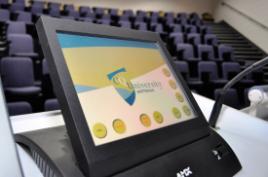It's in the way that we use it
Published on 01 July, 2010
Information technology specialists and Academic and Professional Staff are using new information and communications technologies to transform the way we work with each other at CQUni...
Investments worth $7 million this year and next across approximately 10 collaborative projects and 84 major system changes are dramatically altering interactions among and between staff and students according to six project managers from the Information Technology Directorate (ITD )who presented staff with an update Tuesday on IT developments underway at CQUniversity Australia.
 "Lots of projects and short timelines are what we're working with," explained Roy Pidgeon, a Project Manager who's working on - among other things - ResearchMaster, a new system developed in consultation with the Office of Research and others which will help the University better manage grant applications, publications and research administration.
"Lots of projects and short timelines are what we're working with," explained Roy Pidgeon, a Project Manager who's working on - among other things - ResearchMaster, a new system developed in consultation with the Office of Research and others which will help the University better manage grant applications, publications and research administration.
Upgrades, overhauls and refits to the University's Finance and Student Information Systems (PeopleSoft), TM1 - enterprise planning and forecasting software and TRIM - the records management system -- are all scheduled to occur through June 2011.
And a major shift will occur with student communication as the University considers adopting ‘cloud computing' across the organisation as early as February 2011. Microsoft and Google are investing heavily in ‘cloud technologies' which essentially moves applications from the desktop to the internet. These applications offer services such as lifetime email access, document sharing and collaboration tools with accessibility from anywhere anytime on any device, be it desktop, laptop or even mobile phone.
Over the next six months ITD will be working with groups of students, academics and professional staff as it makes a decision on which provider and features to go with.
"The Student Cloud Collaborative Technologies Project will focus on enhancing our students' ability to work collaboratively with each other throughout University community," said Project Manager Dan Yarrow.
 Additionally Jeff Santamaria, Project Manager for Moodle - the learning management system (also known as a virtual learning environment) introduced in T1 2010 - has confirmed the Moodle implementation project team would remain in place until the end of Term-3 (Feb-2011), and that ITD would work closely with CQUniversity Academics beyond that period to continually improve Moodle and the Learning & Teaching experience.
Additionally Jeff Santamaria, Project Manager for Moodle - the learning management system (also known as a virtual learning environment) introduced in T1 2010 - has confirmed the Moodle implementation project team would remain in place until the end of Term-3 (Feb-2011), and that ITD would work closely with CQUniversity Academics beyond that period to continually improve Moodle and the Learning & Teaching experience.
"Admittedly Term 1 was pretty shaky... we encountered a lot of hiccups between Moodle and the latest version of Oracle (the University's overarching database environment). I think we could have written a white paper on what not to do... But Moodle is catching on in the Higher Education sector and more universities and other organisations are adopting the product, so it will get better," explained Jeff.
Currently 583 courses have been delivered using Moodle with another 489 are due to be delivered in Term-2. Over the last 12 months online courses have moved to Moodle as the University winds down its course delivery through Blackboard and Webfuse learning management systems.
Liferay - software for portals, publishing, content and collaboration - will be used to create new CQUni Staff and Student portals, or centralised places, where individuals will be able to find and access virtually everything they need at work or study from email to Moodle to ESSO (the Human Resources Information System) and more.
 "The staff portal, due to come on line in Term-2 this year, will essentially become an employees' home-page. They'll put everything in there that they need and will customise it to suit their day-to-day needs," offered Jeff.
"The staff portal, due to come on line in Term-2 this year, will essentially become an employees' home-page. They'll put everything in there that they need and will customise it to suit their day-to-day needs," offered Jeff.
University-wide videoconferencing and on-line media get will get a boost, too. CQUniversity has gone from essentially zero hours of videoconferencing in 2005 to 136 hours a week of recorded sessions today, much of which is streamed to students on-line. Acknowledging that about a third of the University's videoconferencing rooms had ‘low reliability", ITD also announced Tuesday a media rejuvenation plan which will include new videoconferencing facilities in Buildings 32 and 5 in Rockhampton and centralised maintenance of all Uni videoconferencing facilities.
Faster downloads, more pod casting and more live streaming will become available, according to Roy Pigeon, over the coming months. In addition the roll-out of VOIP phones (which replace the old Ericsson phones) will be completed at Rockhampton by December 2010.
In addition to Moodle, ITD is progressing the University's Academic Support Systems Project, an undertaking started in 2009 to streamline and integrate scores of business processes and systems that impact students, academics and administrative staff in the delivery of learning and teaching.
"We are moving away from everyone having individual spreadsheets and entering the same information over and over again into different systems," declared Project Manager Bill Gonch and Business Analyst Elizabeth Tansley.
There 5 major components to ASSP, developed in this order, are led by Project Director John Voss:
- The Staff Scheduling & Allocation Module, which is about course scheduling, teaching allocations and timetabling. The great thing about this is that the Scheduling Module will automatically ‘talk' to other systems which make courses available for student enrolment; Moodle, which will automatically allow appropriate security and editing access for teaching staff; timetabling, for the scheduling of classes; Course profiles and the Course Handbook so there is consistent information regarding the offering of courses everywhere.
- The Grading and Assessment Module which will support a number of assessment collection, distribution, marking and review processes.
- The Course Deliverables Module will identifying course and exam requirements, facilitate ordering textbooks, specifying recommended readings, study guides, lab requirements and link to the bookshop, for example, which will place textbook orders or Printing Services to ensure that study guides and resources materials are produced and delivered in a timely manner to students.
- The Program and Course Accreditation Module will streamline existing and new program and course approval, review and directly link information to other systems/publicatiosn such as Course Profiles and the Handbook.
- Finally, a Student Interaction Module designed for students, will come into effect by 2nd Quarter 2011. This service gives the student a single point at which to lodge requests for assignment extensions, deferred exams, special consideration and reviews of grade, course evaluation feedback and teaching evaluation feedback.
"Currently there are nine different ways to make a request for an extension. We - the ASSP team and the Academic Community - want that level of confusion for the student to be cut out," said Bill Gonch.
Technology and systems will come and go. What's really special about the solutions being developed, according to John Voss, is the collaborative nature of the work.
"We can throw money and gadgets and wires around but it's our Academic and Professional colleagues and student needing the functionality, working with ITD, who are really making the technology meaningful and relevant to University's learning and teaching. That's primarily what this is all about."

